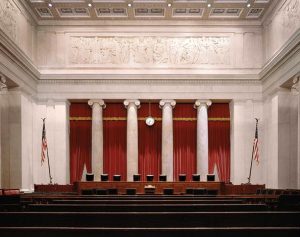US Supreme Court under fire over asylum ruling
 Refugee advocacy groups have slammed a ruling by the US Supreme Court that allows Texas state police to arrest and deport people local officials claim have entered the US illegally.
Refugee advocacy groups have slammed a ruling by the US Supreme Court that allows Texas state police to arrest and deport people local officials claim have entered the US illegally.
NGO Human Rights Watch (HRW) said the ruling, which applies while federal courts consider the constitutionality of these powers, puts people fearing persecution into immediate danger.
HRW said the move also gives disproportionate and overreaching immigration enforcement powers to state and local law enforcement officers.
“National governments are entitled to regulate their borders so long as they comply with international human rights and refugee law,” said Bob Libal, Texas consultant at Human Rights Watch.
“But allowing Texas to run with its draconian system of criminalization and returns of asylum seekers is a recipe for chaos and abuse.”
SB 4, the Texas law the Supreme Court will be reviewing, allows state and local police to arrest migrants entering Texas between official border crossings and charge them with either improper entry, punishable up to 1 year in prison, or improper re-entry, punishable by two to 20 years.
The law allows the state to order the removal of migrants in lieu of a criminal penalty, even if they have a claim to asylum due to fears of persecution or other serious harm if deported.
HRW said the return of asylum seekers to a place where they fear persecution or other serious harm violates US federal law as well as US obligations under international human rights and refugee law.
The group said the ruling is likely to increase racial profiling, clog state courts, and fill jails. It is also likely to distract police from other public safety work by requiring them to instead focus on arresting and prosecuting people seeking to rejoin family, find protection, or make a better life.
Another new Texas state law that went into effect in February creates a mandatory minimum sentence of ten years in prison for people found guilty of smuggling.
HRW said most of the thousands of people booked for smuggling under existing Texas laws were young Texans, who often did nothing more than drive people from border communities to other parts of Texas. Nearly 80 per cent of those booked for smuggling were US citizens, with a median age of 26. Almost 13 percent were 18 or 19 years old.
The laws have come after Texas Governor Greg Abbott’s much criticised program of busing of migrants to Democrat-run cities, as well as his ‘Operation Lone Star’, which advocates say is a discriminatory and abusive operation that targets perceived migrants and others for arrest, prosecution, and incarceration on state misdemeanour and felony offences.
HRW says that there is no evidence ‘Operation Lone Star’ has slowed migration and that the program has led to injuries and deaths, consistently violated the rights of migrants and US citizens, and included attacks on freedoms of association and expression of groups providing basic aid in Texas, Human Rights Watch said.
“Dangerous chases of vehicles thought to contain migrants under Operation Lone Star have led to crashes that killed at least 74 people and injured at least another 189 in a 29-month period,” HRW reported last year.
The agency said the operation has strengthened criminal cartels profiting from migrants needing to attempt to enter the US by traveling through remote and deadly terrain.
NGO Refugees International has also criticised the Supreme Court ruling.
The organisation’s International Director for the Americas and Europe Yael Schacher said: “The majority of the Supreme Court today paved the way for widespread rights violations and upending of federal immigration enforcement in Texas.
“By allowing S.B. 4 to go into effect, the Court has empowered Texas police officers to detain anyone they suspect of unauthorised entry and magistrate judges to order them deported to Mexico,” Ms Schacher said.
“Individuals who fail to comply – even because Mexico refuses to allow them to – may be charged for another crime and imprisoned.
“A Federal District Court in Texas already ruled that SB 4 would violate asylum law and usurp federal authority over entry into and removal from the United States.”












